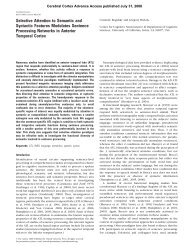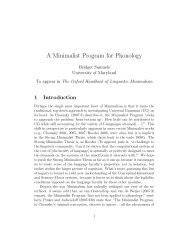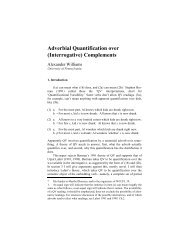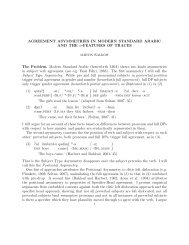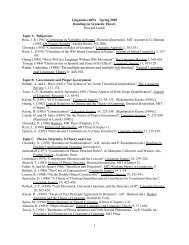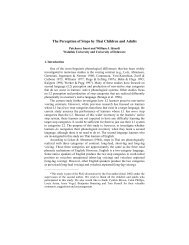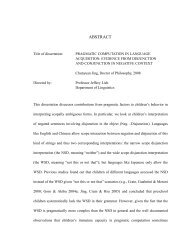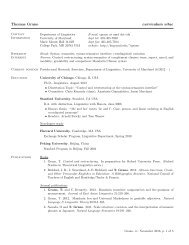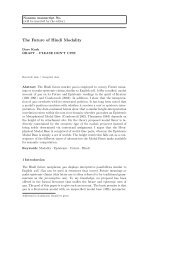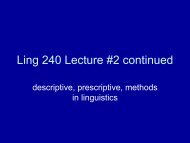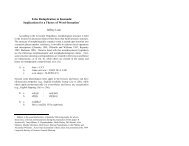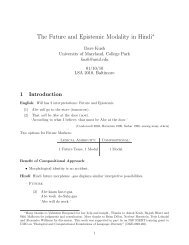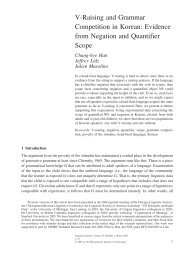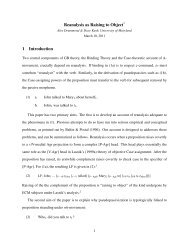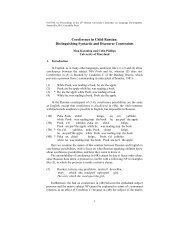The Role of the Imperfect in Romance Counterfactuals ... - Linguistics
The Role of the Imperfect in Romance Counterfactuals ... - Linguistics
The Role of the Imperfect in Romance Counterfactuals ... - Linguistics
You also want an ePaper? Increase the reach of your titles
YUMPU automatically turns print PDFs into web optimized ePapers that Google loves.
<strong>The</strong> <strong>Role</strong> <strong>of</strong> <strong>the</strong> <strong>Imperfect</strong> <strong>in</strong> <strong>Romance</strong> <strong>Counterfactuals</strong> *<br />
Pranav Anand & Valent<strong>in</strong>e Hacquard<br />
UCSC UMD<br />
0. <strong>The</strong> Puzzle<br />
Diverse uses <strong>of</strong> <strong>Romance</strong> imperfect (‘imparfait’) -- progressive (1a), habitual (1b), generic (1c),<br />
counterfactual conditional (1d) -- have long challenged a unified <strong>the</strong>ory.<br />
(1) a. Paul traversait la rue, quand il s’est fait écraser. French<br />
Paul cross-impf <strong>the</strong> street, when he got crushed.<br />
‘Paul was cross<strong>in</strong>g <strong>the</strong> street, when he got run over’<br />
b. Quand elle était jeune, Marie jouait du piano.<br />
When she was young, Marie play-impf <strong>the</strong> piano<br />
c. A l’époque, les femmes portaient des corsets.<br />
In those days, women wore-impf corsets<br />
d. Si Paul venait, Marie serait heureuse.<br />
If Paul come-impf, Marie be-COND happy<br />
‘If Paul came, Marie would be happy.’<br />
• All seem to <strong>in</strong>volve an <strong>in</strong>tensional component, albeit <strong>of</strong> a different nature.<br />
• Progressive, generic and habitual uses all share hallmarks <strong>of</strong> <strong>Imperfect</strong> (ongo<strong>in</strong>gness,<br />
obligatory past reference, necessity for contextual fram<strong>in</strong>g – Delfitto & Bert<strong>in</strong>etto 1995,<br />
Bonomi 1997), but counterfactual uses do not, and can’t easily be <strong>in</strong>corporated to<br />
unify<strong>in</strong>g analyses <strong>of</strong> <strong>the</strong> <strong>Imperfect</strong>.<br />
Goal: Expla<strong>in</strong> why <strong>Imperfect</strong> is so <strong>of</strong>ten associated with counterfactuality, while still giv<strong>in</strong>g our<br />
semantics enough leeway to expla<strong>in</strong> differences between counterfactual and o<strong>the</strong>r uses.<br />
Our proposal:<br />
Despite desirability <strong>of</strong> unification, we propose 2 different semantic elements responsible for<br />
prog/hab/gen uses (modal IMPF) and counterfactual uses (future modal FUT), given <strong>the</strong> latter<br />
lack hallmarks <strong>of</strong> <strong>the</strong> <strong>Imperfect</strong>.<br />
prog/hab/gen: IMPF = modal1 {+ past & fram<strong>in</strong>g presuppositions}<br />
↓<br />
‘imparfait’<br />
counterfactual: IMPF = modal1 {+ past & fram<strong>in</strong>g presuppositions}<br />
+ FUT =<br />
↓<br />
modal2<br />
‘conditionnel’ = ‘imparfait’ + ‘futur’<br />
* Thanks to Graham Katz, <strong>the</strong> participants <strong>of</strong> L<strong>in</strong>g661 at UMD and <strong>of</strong> <strong>the</strong> Workshop on <strong>the</strong> <strong>Imperfect</strong>ive at Yale,<br />
especially Edith Doron, for useful feedback.
Anand & Hacquard <strong>The</strong> role <strong>of</strong> <strong>the</strong> imperfect <strong>in</strong> romance counterfactuals<br />
• Yet, we treat ‘<strong>Imperfect</strong>’ uniformly as morpho spell-out <strong>of</strong> IMPF.<br />
• <strong>Counterfactuals</strong> <strong>in</strong>volve both IMPF and FUT, both visible <strong>in</strong> French conditionnel<br />
(Iatridou 2000).<br />
• IMPF makes a modal contribution (responsible for ‘ongo<strong>in</strong>gness’) AND presupposes<br />
anteriority and fram<strong>in</strong>g hallmarks <strong>of</strong> <strong>the</strong> <strong>Imperfect</strong> (Giorgi&Pianesi 2004)<br />
• Crucially, IMPF quantifies vacuously <strong>in</strong> counterfactuals (a consequence <strong>of</strong> stack<strong>in</strong>g<br />
modals under Hacquard’s (2006) event-relative modality). BUT:<br />
• Past + fram<strong>in</strong>g presuppositions rema<strong>in</strong>, trigger<strong>in</strong>g counterfactual nature <strong>of</strong> conditionals<br />
with imperfect (Iatridou 2000, Condoravdi 2001, Ippolito 2003, Arregui 2005).<br />
<strong>The</strong> plan:<br />
1. Hallmarks <strong>of</strong> <strong>the</strong> <strong>Imperfect</strong> <strong>in</strong> <strong>Romance</strong><br />
2. A Semantics <strong>of</strong> IMPF<br />
3. <strong>The</strong> <strong>Imperfect</strong> and Counterfactuality<br />
1. Hallmarks <strong>of</strong> <strong>the</strong> <strong>Imperfect</strong> <strong>in</strong> <strong>Romance</strong><br />
• Anteriority: prog/hab/gen uses (1a-c) require <strong>the</strong> event <strong>the</strong>y describe to occur <strong>in</strong> <strong>the</strong> past.<br />
• Ongo<strong>in</strong>gness/homogeneity: Prog (2a) and hab/gen (2b) uses require <strong>the</strong> event/habit <strong>the</strong>y<br />
describe to go on <strong>in</strong> time: Paul’s piano play<strong>in</strong>g is taken to last throughout an <strong>in</strong>terval<br />
surround<strong>in</strong>g M’s arrival <strong>in</strong> (2a); his piano play<strong>in</strong>g habit throughout an <strong>in</strong>terval<br />
surround<strong>in</strong>g ‘those days’:<br />
(2) a. Quand Marie est arrivée, Paul jouait du piano.<br />
When Marie arrived-pfv, Paul played-impf <strong>of</strong> <strong>the</strong> piano<br />
‘When Marie came <strong>in</strong>, Paul was play<strong>in</strong>g <strong>the</strong> piano’<br />
b. A l’époque, Paul jouait du piano.<br />
In those days, Paul played-impf <strong>of</strong> <strong>the</strong> piano.<br />
‘In those days, Paul played <strong>the</strong> piano’ (habitually)’<br />
• Fram<strong>in</strong>g: Sentences with <strong>Imperfect</strong> weird out <strong>of</strong> <strong>the</strong> blue (a): require temporal adverbial<br />
(b), when-clause (c), quantificational adverb (d), or contextually salient time <strong>in</strong>terval (e):<br />
(3) a.<br />
??<br />
Paul jouait du piano.<br />
Paul played-impf <strong>the</strong> piano<br />
b. A c<strong>in</strong>q heures, Paul jouait du piano.<br />
At 5 o’clock, Paul played-impf <strong>the</strong> piano<br />
c. Quand Marie est arrivée, Paul jouait du piano.<br />
When Marie arrived, Paul played-impf <strong>the</strong> piano<br />
d. A chaque fois que Marie arrivait, Paul jouait du piano.<br />
Every time Marie arrived, Paul played-impf <strong>the</strong> piano<br />
e. A: Que faisait Paul à 5 heures? B: Il jouait du piano.<br />
What was Paul do<strong>in</strong>g at 5? B: He played-impf <strong>the</strong> piano<br />
2
S<strong>in</strong>n und Bedeutung 14, Vienna September 28, 2009<br />
• Modal quantification:<br />
Progressive: Inertia worlds (Dowty 1979), Cont<strong>in</strong>uation branches (Landman 1992),<br />
Non <strong>in</strong>terrupted circumstantial worlds (Portner 1998)…<br />
Generics: Normal/ideal worlds (Krifka et al. 1995)…<br />
Habituals: Normal/ideal worlds (Krifka et al. 1995),<br />
Non <strong>in</strong>terrupted circumstantial worlds (Ferreira 2005)…<br />
<strong>Counterfactuals</strong>: Similar worlds (Lewis 1973, Stalnaker 1968, Arregui 2005…),<br />
Metaphysical alternatives (Condoravdi 2001…)<br />
Towards some unification:<br />
o Progressives and habituals <strong>in</strong>volve same modal element (Cipria&Roberts 2000,<br />
Bonomi 1997, Lenci&Bert<strong>in</strong>etto 2000, Ferreira 2005).<br />
o Habituals as special case <strong>of</strong> generics: differences <strong>in</strong> requirement for verify<strong>in</strong>g<br />
<strong>in</strong>stances (Krifka et al 1995 and references <strong>the</strong>re<strong>in</strong>).<br />
However: <strong>Counterfactuals</strong> seem to <strong>in</strong>volve a different modal element altoge<strong>the</strong>r.<br />
2. A Semantics for IMPF<br />
We adopt a semantics for a s<strong>in</strong>gle IMPF operator, responsible for prog/hab/generic read<strong>in</strong>gs,<br />
which <strong>in</strong>cludes <strong>the</strong> follow<strong>in</strong>g <strong>in</strong>gredients:<br />
IMPF = Past +Fram<strong>in</strong>g + Ongo<strong>in</strong>gness + modality<br />
Presuppositions modal quantification<br />
(Giorgi&Pianesi 2004) (Portner’s 1998 Progressive)<br />
NB: we take Portner (1998)/Ferreira (2005) l<strong>in</strong>e, as its event-relativity allows a straightforward<br />
implementation for our analysis <strong>of</strong> counterfactuals.<br />
2.1. Modal Quantification<br />
• We assume ongo<strong>in</strong>gness requirement <strong>of</strong> imperfect is modal quantification<br />
(cf. Dowty 1979, Landman 1992, Portner 1998, Zucchi 1999, Cipria & Roberts 2000).<br />
• We adopt Portner’s (1998) quantification over best circumstantial worlds (best relative to<br />
<strong>the</strong> property <strong>of</strong> <strong>the</strong> event <strong>in</strong> progress), where no <strong>in</strong>terruptions occur.<br />
(4) [[IMPF(e,P]] c,g is true at w iff for all worlds w’ <strong>in</strong> Best(Circ, NI, e, P)<br />
<strong>the</strong>re is an event e’ which <strong>in</strong>cludes e as a nonf<strong>in</strong>al subpart s.t. P(w’)(e’)=1<br />
(5) (A 5 heures), Paul jouait du piano.<br />
(At 5pm), Paul was play<strong>in</strong>g <strong>the</strong> piano.<br />
<strong>The</strong>re’s a past event e s.t. <strong>in</strong> all best circumstantial worlds where Paul isn’t <strong>in</strong>terrupted,<br />
<strong>the</strong>re is a superevent e’ <strong>of</strong> e which is an event <strong>of</strong> Paul play<strong>in</strong>g <strong>the</strong> piano.<br />
3
Anand & Hacquard <strong>The</strong> role <strong>of</strong> <strong>the</strong> imperfect <strong>in</strong> romance counterfactuals<br />
• Follow<strong>in</strong>g Ferreira (2005), we extend Portner (1998) to habitual/generic 1 cases by<br />
<strong>in</strong>vok<strong>in</strong>g plural events:<br />
(6) (A l’epoque), Paul jouait du piano.<br />
(In those days), Paul played <strong>the</strong> piano.<br />
<strong>The</strong>re’s a past event e s.t. <strong>in</strong> all best circumstantial worlds where Paul isn’t <strong>in</strong>terrupted,<br />
<strong>the</strong>re is a superevent e’ <strong>of</strong> e which is a plurality <strong>of</strong> events <strong>of</strong> Paul play<strong>in</strong>g <strong>the</strong> piano.<br />
• In both cases, we have an extensional element (eExt), an event that occurs <strong>in</strong> <strong>the</strong> actual<br />
world, which is part <strong>of</strong> a larger, completed event or series <strong>of</strong> events <strong>in</strong> <strong>the</strong> modal worlds.<br />
⇒ What is this extensional element eExt?<br />
• A (topical) event that needs to be made salient by <strong>the</strong> context (and can be viewed as a<br />
reformulation <strong>of</strong> an Aust<strong>in</strong>ian topic).<br />
• This topical event is <strong>in</strong> turn responsible for <strong>the</strong> fram<strong>in</strong>g requirement <strong>of</strong> IMPF.<br />
2.2. Anteriority and Fram<strong>in</strong>g Requirements as Presuppositions<br />
• Denotation <strong>in</strong> (4) (be<strong>in</strong>g that <strong>of</strong> progressive) doesn’t capture past time nor fram<strong>in</strong>g<br />
requirements <strong>of</strong> imperfect. We take those to be presuppositions (Giorgi & Pianesi 2004).<br />
Our <strong>in</strong>tuition: requirement for temporal fram<strong>in</strong>g comes from extensional component (eExt) <strong>of</strong><br />
IMPF truth-conditions.<br />
• Follow<strong>in</strong>g Giorgi & Pianesi (2004), we assume <strong>the</strong> event’s run-time must be conta<strong>in</strong>ed <strong>in</strong><br />
a topical <strong>in</strong>terval (TOP-TIME(c)), which must precede <strong>the</strong> local evaluation time, t0.<br />
(7) [[IMPF]] c,g is def<strong>in</strong>ed iff :<br />
a) t(e) ⊆ TOP-TIME(c) fram<strong>in</strong>g requirement<br />
b) TOP-TIME(c) < t0 anteriority requirement<br />
If def<strong>in</strong>ed, [[IMPF]] c,g = λe λPεt ∀w ∈Best(Circ, NI, e, P) [∃ e’ e< e’ & P(w)(e’)=1].<br />
NB: IMPF’s denotation makes direct reference to event argument that serves both for presups<br />
and modal order<strong>in</strong>g (<strong>in</strong> l<strong>in</strong>e with Hacquard’s 2006 event-relative modality; cf. section 3.1)<br />
(8) 3 ∀w∈Best(Circ, NI, e, λe.P_play_piano(e) ) [∃e’ e< e’ & P_play_piano (w)(e’)=1]<br />
λeExt 3VP λe. P_play_piano (e)<br />
2 5<br />
IMPF eExt Paul jouait du piano<br />
1 We take generics and habituals to <strong>in</strong>volve <strong>the</strong> same operator. For special cases <strong>of</strong> generics that don’t require<br />
verify<strong>in</strong>g <strong>in</strong>stances (e.g., this mach<strong>in</strong>e crushes oranges), we take <strong>the</strong> extensional element to be <strong>the</strong> preparatory<br />
process, i.e., a subpart <strong>of</strong> <strong>the</strong> event before culm<strong>in</strong>ation occurs, dur<strong>in</strong>g which <strong>the</strong> preparations for its occurrence are<br />
completed (Moens & Steedman 1988, Cipria and Roberts 2000).<br />
4
S<strong>in</strong>n und Bedeutung 14, Vienna September 28, 2009<br />
(9) [[ (5) ]] c,g = def<strong>in</strong>ed iff <strong>the</strong>re’s a topical event e conta<strong>in</strong>ed <strong>in</strong> past topical <strong>in</strong>terval.<br />
If so, true iff <strong>in</strong> all best circumstantial worlds with least <strong>in</strong>terruptions, e is a subevent <strong>of</strong><br />
an event e’ <strong>of</strong> P play<strong>in</strong>g piano.<br />
Fram<strong>in</strong>g requirement: Given def<strong>in</strong>edness conditions <strong>in</strong> (7), oddness <strong>of</strong> (3a) out <strong>of</strong> <strong>the</strong> blue<br />
results from topic time <strong>of</strong> context not be<strong>in</strong>g set.<br />
Anteriority requirement: Similarly, if TOP-TIME(c) doesn’t precede t0: presupposition failure.<br />
(10) {Ce mat<strong>in</strong>, *Aujourd’hui}, Paul jouait du piano.<br />
{this morn<strong>in</strong>g, *today} Paul was play<strong>in</strong>g <strong>the</strong> piano-impf<br />
‘This morn<strong>in</strong>g/*Today, Paul was play<strong>in</strong>g <strong>the</strong> piano.’<br />
Sett<strong>in</strong>g <strong>the</strong> topic time:<br />
• Temporal adjuncts and adverbs <strong>of</strong> quantification can all set <strong>the</strong> topic time 2 (by serv<strong>in</strong>g as<br />
temporal topics, shift<strong>in</strong>g <strong>the</strong> evaluation time-- Giorgi&Pianesi 2004, or by successive<br />
update <strong>of</strong> <strong>the</strong> topical <strong>in</strong>terval for adverbs).<br />
• As demonstrated <strong>in</strong> (3e) <strong>the</strong> fram<strong>in</strong>g adverb need not be syntactically present. Nor <strong>in</strong> fact<br />
need it be mentioned <strong>in</strong> <strong>the</strong> discourse, so long as it can be retrieved as lifetime <strong>of</strong> subject:<br />
(11) a. Les d<strong>in</strong>osaures mangaient de la viande.<br />
<strong>The</strong> d<strong>in</strong>osaurs eat-impf <strong>of</strong> <strong>the</strong> meat.<br />
‘D<strong>in</strong>osaurs ate meat.’<br />
b. ??Les femmes portaient des corsets.<br />
Women wore-impf corsets.<br />
‘Women wore corsets.’<br />
3. <strong>The</strong> <strong>Imperfect</strong> and Counterfactuality<br />
• <strong>Counterfactuals</strong> seem to lack imperfective hallmarks:<br />
(12) a. Si Paul arrivait dema<strong>in</strong>, il rencontrerait Marie.<br />
If Paul arrive-impf tomorrow, he met-COND(fut+impf) Marie<br />
‘If Paul arrived tomorrow, he would meet Marie.’<br />
b. Si Paul écrivait a Marie, elle serait contente.<br />
If Paul wrote-impf to Marie, she be happy-COND(fut+impf)<br />
If Paul wrote to Marie, she would be happy.’<br />
2 Temporal adjuncts serve to set <strong>the</strong> topical temporal <strong>in</strong>terval via a monstrous operator (cf. Bittner 2007):<br />
(1) [[T-Adv XP]] c,g = [[XP]] c’,g , where time(c’)=[[T-Adv]] c,g .<br />
[[T-Adv]] c,g = λP χt. 1 iff P(χ’,t)=1 where TOP-TIME(χ’) determ<strong>in</strong>ed by T-Adv & χ’ exactly χ on o<strong>the</strong>r coord<strong>in</strong>ates.<br />
Putt<strong>in</strong>g (i) toge<strong>the</strong>r with (7) yields <strong>the</strong> presupposition that t(e)⊆TOP-TIME(c), which is now set to <strong>the</strong> time <strong>in</strong>terval<br />
provided by temporal adverb. This is not <strong>the</strong> only possibility. We could pursue a dynamic approach, where<strong>in</strong> IMPF<br />
is anaphoric to a salient past <strong>in</strong>terval, ei<strong>the</strong>r supplied by discourse or sentence-<strong>in</strong>ternally.<br />
5
Anand & Hacquard <strong>The</strong> role <strong>of</strong> <strong>the</strong> imperfect <strong>in</strong> romance counterfactuals<br />
o Do not seem to describe past events.<br />
o May be said out <strong>of</strong> <strong>the</strong> blue.<br />
o Do not require ‘ongo<strong>in</strong>gness’ <strong>of</strong> <strong>the</strong> events described <strong>in</strong> antecedent/consequent<br />
(<strong>the</strong> arriv<strong>in</strong>g, <strong>the</strong> meet<strong>in</strong>g and <strong>the</strong> writ<strong>in</strong>g can be understood as completed events)<br />
• Why should that be if counterfactuals <strong>in</strong>volve IMPF?<br />
Actually: counterfactuals don’t <strong>in</strong>volve just IMPF, but conditionnel mood <strong>in</strong> <strong>the</strong> consequent,<br />
which, follow<strong>in</strong>g Iatridou (2000), we take to be bimorphemic (‘imperfect’ + ‘future’)<br />
… arriv-ait … rencontre-r-ait<br />
impf fut-impf<br />
Start<strong>in</strong>g Assumption: IMPF on top <strong>of</strong> a FUT (Iatridou 2000).<br />
wo<br />
IMPF ri<br />
2 qconseq<br />
FUT pantec.<br />
NB: this syntactic structure not completely transparent, given some morpho block<strong>in</strong>g, due to<br />
agreement <strong>in</strong> both antecedent and consequent with higher IMPF.<br />
• Both antecedent & consequent have obligatory imperfect morpho <strong>in</strong> counterfactuals:<br />
(13) a. Si Paul arrivait dema<strong>in</strong>, il rencontrerait Marie.<br />
If Paul arrive-impf tomorrow, he met-COND Marie<br />
b. *Si Paul arrivera dema<strong>in</strong>, il rencontrerait Marie.<br />
If Paul arrive-fut tomorrow, he met-COND Marie<br />
c. *Si Paul arrivait dema<strong>in</strong>, il rencontrera Marie.<br />
If Paul arrive-impf tomorrow, he met-fut Marie<br />
• In Quebecois French, agreement is complete: both antecedent and consequent bear<br />
conditionnel: 3<br />
(14) Si Paul serait là, Marie serait heureuse.<br />
if Paul be-COND <strong>the</strong>re, Marie be-COND happy<br />
‘If Paul were <strong>the</strong>re, Marie would be happy.’ (Michael Gagnon, p.c.)<br />
• Antecedent and consequent host <strong>the</strong>ir own aspects (unpronounced due to morpho<br />
block<strong>in</strong>g by IMPF), responsible for completed (12) and ongo<strong>in</strong>g (15) <strong>in</strong>terpretations:<br />
(15) Si Jean courrait régulièrement, il serait en ple<strong>in</strong>e forme.<br />
If Jean run-impf regularly, he be-COND <strong>in</strong> good form<br />
‘If Jean ran regularly, he would be healthy.’<br />
3 A related question we will not address here is <strong>the</strong> ability <strong>of</strong> imperfect to show SOT effects (Kamp & Rohrer 1984).<br />
Given semantics <strong>in</strong> (6), SOT effects would m<strong>in</strong>imally require removal <strong>of</strong> anteriority presupposition.<br />
6
S<strong>in</strong>n und Bedeutung 14, Vienna September 28, 2009<br />
Now that we have both IMPF and FUT, how do we derive counterfactual mean<strong>in</strong>gs?<br />
Proposal <strong>in</strong> a nutshell:<br />
• IMPF’s modal element (which <strong>in</strong>duces ongo<strong>in</strong>gness with IMPF) is neutralized. Modal<br />
element at work <strong>in</strong> counterfactuals is FUT.<br />
o Neutralization via event-relative modality: IMPF & FUT relative to same event.<br />
(16)<br />
3<br />
λeExt wo<br />
2 ri<br />
IMPF eExt 2 qconseq<br />
1 pantec.<br />
FUT eExt<br />
• Apart from IMPF, (16) amounts to a future conditional.<br />
• What gives conditionals a counterfactual <strong>in</strong>terpretation is ‘pastness’ (cf. Iatridou 2000,<br />
Condoravdi 2001, Ippolito 2003, Arregui 2005):<br />
(17) If Paul marries Mary, he will move to New York.<br />
(18) If Paul married Mary, he would move to New York.<br />
• While IMPF’s modal element is neutralized, its presuppositions <strong>of</strong> past & fram<strong>in</strong>g still<br />
enforced: <strong>the</strong>y <strong>in</strong>duce counterfactuality <strong>of</strong> <strong>the</strong> future conditional.<br />
3.1. Basic Ingredients <strong>of</strong> Counterfactuality: IMPF and FUT<br />
Assumptions:<br />
• IMPF and FUT are event-relative modals:<br />
o Recall IMPF:<br />
(19) [[IMPF]] c,g def<strong>in</strong>ed iff t(e) ⊆ TOP-TIME(c) & TOP-TIME(c) < t0.<br />
If def<strong>in</strong>ed, [[IMPF]] c,g = λe λPεt ∀w ∈Best(Circ, NI, e, P) [∃ e’ e< e’ & P(w)(e’)=1].<br />
o Follow<strong>in</strong>g Condoravdi (2001), Copley (2003), Ippolito (2003), we assume FUT is<br />
metaphysical modal, which comb<strong>in</strong>es with two properties <strong>of</strong> times.<br />
o To make FUT event-relative, we construct metaphysical alternatives w.r.t an<br />
event argument <strong>of</strong> <strong>the</strong> modal (we assume future shift<strong>in</strong>g <strong>of</strong> <strong>the</strong> temporal now<br />
follow<strong>in</strong>g Abusch 1998):<br />
(20) [[FUT]] c,g = λe λpist λqist.∀w ∈Best(Meta(e) where p([t0, ∞))(w)) [q([t0, ∞))(w) =1].<br />
• IMPF and FUT will be relative to <strong>the</strong> same event.<br />
7
Anand & Hacquard <strong>The</strong> role <strong>of</strong> <strong>the</strong> imperfect <strong>in</strong> romance counterfactuals<br />
-----------------------------------------------------------------------------------------------------------<br />
Event-relative modality allows two modals anchored to <strong>the</strong> same event b<strong>in</strong>der.<br />
(21)<br />
o Without <strong>in</strong>terven<strong>in</strong>g material, this produces vacuous modal quantification by <strong>the</strong> first.<br />
o This occurs because 2 nd modal anchored to an evaluation event, not worlds quantified<br />
over by higher modal:<br />
3∀w ∈ Acc(e)[∀w’ ∈ Acc(e) [p(w’)=1]] , or ∀w’ ∈ Acc(e) [p(w’)=1]<br />
λe 3∀w’ ∈ Acc(e) [p(w’)=1]<br />
1 2<br />
modal e 1 p<br />
modal’ e<br />
Hacquard (2006) argues this happens with epistemics under doxastic attitudes:<br />
(22) Asp λe [dox-att e ] [CP … [modal e] …]<br />
a. John believes that it might be ra<strong>in</strong><strong>in</strong>g.<br />
b. [John believe(e) [CP that [ModP might (e) [TP it is ra<strong>in</strong><strong>in</strong>g ] ] ]<br />
c. ∃e[e <strong>in</strong> w & Exp(e,J.) & belief’(e) & ∀w’∈DOX(e):<br />
∃w’’∈DOX (e): ∃e’[e’ <strong>in</strong> w’ & ra<strong>in</strong>(e’,w’’)] ]<br />
d. ∃e[e <strong>in</strong> w & Exp(e,J.) & belief’(e) & ∃w’ ∈ DOX(e): ∃e’[e’ <strong>in</strong> w’ & ra<strong>in</strong>(e’,w’)] ]<br />
e. <strong>The</strong>re is a past belief state <strong>of</strong> J. s.t. it is ra<strong>in</strong><strong>in</strong>g <strong>in</strong> some world compatible with his<br />
belief state<br />
-----------------------------------------------------------------------------------------------------------<br />
Summariz<strong>in</strong>g assumptions:<br />
o ma<strong>in</strong> clause: IMPF scop<strong>in</strong>g over FUT conditional<br />
o conditional clauses: properties <strong>of</strong> time (AspPs, with null Asp)<br />
Ma<strong>in</strong> <strong>in</strong>tuition <strong>of</strong> derivation: counterfactual is past metaphysical conditional<br />
(Condoravdi 2001; Copley 2003; Ippolito 2003)<br />
o IMPF loses its modal force <strong>in</strong> this construction<br />
o this is derivable by vacuous quantification <strong>in</strong> event-relative modality<br />
3.2. Deriv<strong>in</strong>g Counterfactuality<br />
IMPF & FUT relative to same event, hence modal element <strong>of</strong> IMPF quantifies vacuously.<br />
However: IMPF’s presuppositions survive, trigger<strong>in</strong>g past and fram<strong>in</strong>g requirements.<br />
• (16) structurally parallel to (21), trigger<strong>in</strong>g vacuous quantification <strong>of</strong> IMPF’s modal:<br />
truth-conditionally, (16) will be evaluated as a future conditional.<br />
8
S<strong>in</strong>n und Bedeutung 14, Vienna September 28, 2009<br />
• IMPF imposes two presuppositional requirements on extensional event eExt. That is, (16)<br />
yields <strong>the</strong> follow<strong>in</strong>g <strong>in</strong>terpretation: 4<br />
(23) [[(16)]] c,g = λeExt: t(eExt) ⊆ TOP-TIME(c) & TOP-TIME(c)
Anand & Hacquard <strong>The</strong> role <strong>of</strong> <strong>the</strong> imperfect <strong>in</strong> romance counterfactuals<br />
Anteriority and Fram<strong>in</strong>g presuppositions <strong>of</strong> IMPF allow us to hone <strong>in</strong> on that fork<strong>in</strong>g event <strong>in</strong><br />
counterfactuals, and to derive contrary to fact implicature <strong>of</strong> <strong>the</strong> antecedent.<br />
3.3 <strong>The</strong> Anteriority Presupposition<br />
• (23) requires that felicitous use <strong>of</strong> a counterfactual conditional be made w.r.t. an event<br />
that occurred prior to t0.<br />
o metaphysical modality <strong>of</strong> future modal relativized to world and time <strong>of</strong> this event.<br />
• Condoravdi (2001)/Ippolito (2003): counterfactual component <strong>of</strong> counterfactual<br />
conditionals results from evaluat<strong>in</strong>g metaphysical alternatives <strong>in</strong> <strong>the</strong> past.<br />
o In this work, <strong>the</strong> anteriority <strong>of</strong> alternatives is a result <strong>of</strong> tense.<br />
o In <strong>the</strong> event-relative system, it is due to an event constra<strong>in</strong>ed to be <strong>in</strong> <strong>the</strong> past.<br />
o Settledness <strong>of</strong> <strong>the</strong> past is what yields <strong>the</strong> contrary-to-fact implicature.<br />
3.4. <strong>The</strong> Fram<strong>in</strong>g Presupposition<br />
Fram<strong>in</strong>g presupposition enforces run-time <strong>of</strong> extensional event with<strong>in</strong> contextual topic time.<br />
• For regular imperfects, this means a contextual time must be made salient by temporal<br />
adverbials, or, exceptionally, via lexical content <strong>of</strong> DPs which can pragmatically<br />
<strong>in</strong>troduce topical <strong>in</strong>tervals:<br />
(26) Les d<strong>in</strong>osaures mangaient de la viande.<br />
<strong>The</strong> d<strong>in</strong>osaurs eat-impf <strong>of</strong> <strong>the</strong> meat.<br />
‘D<strong>in</strong>osaurs ate meat.’<br />
• <strong>Counterfactuals</strong>, however, seem to lack <strong>the</strong> requirement for a time adverbial.<br />
Proposal: In parallel to (26), antecedents <strong>in</strong>troduce a salient time <strong>in</strong>terval, namely <strong>the</strong> time <strong>of</strong><br />
<strong>the</strong> fork<strong>in</strong>g event that led to <strong>the</strong> settlement <strong>of</strong> <strong>the</strong> antecedent.<br />
• Antecedent pragmatically sets TOP-TIME(c) to <strong>in</strong>terval immediately bound<strong>in</strong>g <strong>the</strong> run time<br />
<strong>of</strong> <strong>the</strong> event which settled p (cf. Ippolito’s 2008 foreclos<strong>in</strong>g <strong>of</strong> a historical issue).<br />
• Settl<strong>in</strong>g event <strong>the</strong>n serves as a fork, produc<strong>in</strong>g divergence <strong>in</strong>to p and ¬p worlds, and<br />
hence <strong>the</strong> metaphysical alternatives at <strong>the</strong> time <strong>of</strong> <strong>the</strong> event <strong>in</strong>clude both types <strong>of</strong> worlds 6 :<br />
(27) If McCa<strong>in</strong> were President, GM would be bankrupt.<br />
In (27), <strong>the</strong> settl<strong>in</strong>g event is <strong>the</strong> 2008 elect<strong>in</strong>g event.<br />
6 <strong>The</strong>re seem to be counterfactuals that can be asserted without reference to a particular fork<strong>in</strong>g event, but to a<br />
family <strong>of</strong> fork<strong>in</strong>g events. We leave <strong>the</strong>se to future research.<br />
10
S<strong>in</strong>n und Bedeutung 14, Vienna September 28, 2009<br />
Summariz<strong>in</strong>g<br />
• Non-counterfactual cases: fram<strong>in</strong>g presupposition serves to temporally locate an<br />
extensional sub-event with<strong>in</strong> some <strong>in</strong>dependent temporal <strong>in</strong>terval provided by context (or<br />
context shift<strong>in</strong>g <strong>of</strong> temporal adverbs).<br />
• Counterfactual cases: fram<strong>in</strong>g presupposition <strong>in</strong>dividuates a fork<strong>in</strong>g event via <strong>the</strong><br />
temporal <strong>in</strong>terval evoked by <strong>the</strong> antecedent clause.<br />
Conclusion:<br />
o Account for presence <strong>of</strong> <strong>Imperfect</strong> <strong>in</strong> counterfactuals, despite counterfactuals lack<strong>in</strong>g its<br />
traditional hallmarks.<br />
o Argue counterfactuals <strong>in</strong>volve both a IMPF and a FUT, as suggested by morphology.<br />
Fur<strong>the</strong>r issues:<br />
o FUT provides modal quantification (modal quantification <strong>of</strong> IMPF neutralized via<br />
vacuous quantification due to event-relativity <strong>of</strong> modals)<br />
o IMPF provides anteriority and fram<strong>in</strong>g presuppositions.<br />
� Counterfactual implicature (that <strong>the</strong> antecedent doesn’t hold) results from<br />
<strong>the</strong>se presuppositions: <strong>the</strong>y force a past topical event, <strong>the</strong> ‘fork<strong>in</strong>g’ event.<br />
• Why do counterfactuals and generics morphologically pattern toge<strong>the</strong>r crossl<strong>in</strong>guistically,<br />
exclud<strong>in</strong>g progressive (Iatridou 2000)?<br />
• Why do some languages use <strong>the</strong> past for counterfactuals and o<strong>the</strong>rs <strong>the</strong> imperfect?<br />
• Why do certa<strong>in</strong> counterfactuals solely require <strong>the</strong> <strong>Imperfect</strong> (without a future element),<br />
cf. Ippolito's (2004) imperfect conditionals.<br />
References:<br />
Abusch, D. (1998) ‘Generaliz<strong>in</strong>g Tense Semantics for Future Contexts’, Events and Grammar,<br />
pp. 13-33.<br />
Arregui, A. (2005) On <strong>the</strong> Accessibility <strong>of</strong> Possible Worlds: <strong>the</strong> <strong>Role</strong> <strong>of</strong> Tense and Aspect.<br />
Arregui, A. (2007) ‘When aspect matters: <strong>the</strong> case <strong>of</strong> would –conditionals.’ Natural Language<br />
Semantics, Vol. 15, No. 3. (2007), pp. 221-264.<br />
Bonomi, A. (1997) ‘Aspect, Quantification and when-clauses <strong>in</strong> Italian’. L<strong>in</strong>guistics &<br />
Philosophy 20.<br />
Bennett, J. (2003) A philosophical guide to conditionals, Clarendon Press, Oxford.<br />
Bittner, M. (2007) Onl<strong>in</strong>e update: Temporal, modal and de se anaphora <strong>in</strong> polysyn<strong>the</strong>tic<br />
discourse. In: Direct Compositionality (C. Barker and P. Jacobson, eds.), Chap. 11, pp.<br />
363–404. Oxford University Press, Oxford.<br />
Cipria, A and C. Roberts (2000) ‘Spanish “imperfecto” and “pretérito”: multiple <strong>in</strong>terpretations<br />
and ambiguous truth conditions”. Natural Language Semantics, 8 (4), pp. 297-347.<br />
11
Anand & Hacquard <strong>The</strong> role <strong>of</strong> <strong>the</strong> imperfect <strong>in</strong> romance counterfactuals<br />
Condoravdi, C. (2001) ‘Temporal Interpretations <strong>of</strong> modals’, <strong>in</strong> D. Beaver et al (eds.) Stanford<br />
Papers <strong>in</strong> Semantics. Palo Alto: CSLI Publications.<br />
Copley, B. (2002) <strong>The</strong> Semantics <strong>of</strong> <strong>the</strong> Future. Ph. D. <strong>The</strong>sis, MIT.<br />
Dowty, D. (1979) Word Mean<strong>in</strong>g and Montague Grammar. Kluwer, Dordrecht.<br />
Ferreira, M. (2005) Event Quantification and Plurality. Ph. D. <strong>The</strong>sis, MIT.<br />
Giorgi, F. and A. Pianesi: 2004, ‘On <strong>the</strong> Speaker’s and <strong>the</strong> Subject’s Temporal Representation’<br />
<strong>in</strong> J. Guéron and J. Lecarme (eds.) <strong>The</strong> Syntax <strong>of</strong> Time. Cambridge, MA: MIT Press.<br />
Hacquard, V. (2006) Aspects <strong>of</strong> Modality. Ph.D. <strong>The</strong>sis, MIT.<br />
Iatridou, S. (2000) ‘<strong>The</strong> Grammatical Ingredients <strong>of</strong> Counterfactuality’. LI 31.<br />
Ippolito, M. (2003) ‘Presuppositions and Implicatures <strong>in</strong> <strong>Counterfactuals</strong>’, Natural Language<br />
Semantics 11, pp. 145–186.<br />
Ippolito, M. (2004) ‘<strong>Imperfect</strong> Conditionals’, <strong>The</strong> Syntax <strong>of</strong> Time. Cambridge, MA: MIT Press.<br />
Ippolito, M. (2008) ‘Subjunctive Conditionals.’ Proceed<strong>in</strong>gs <strong>of</strong> SuB12, Oslo, pp. 256–270.<br />
Kamp, H. and Rohrer, C. (1984) Indirect Discourse. m.s., Aust<strong>in</strong> & Stuttgart.<br />
Katz, G. (2001). ‘(A)temporal complements,’ Audiatur Vox Sapientiae Akademie-Verlag, Berl<strong>in</strong>.<br />
Krifka, M. Pelletier, F.J., Carlson, G. N. , Chierchia, G. , L<strong>in</strong>k, , G. and ter Meulen A. (1995)<br />
‘Introduction to Genericity’, <strong>The</strong> Generic Book, Chicago University Press.<br />
Moens and Steedman (1988) ‘Temporal ontology and temporal reference’, Computational<br />
L<strong>in</strong>guistics, 14(2): pp. 61-67.<br />
Landman, F. (1992) ‘<strong>The</strong> Progressive’ Natural Language Semantics 1: 1–32.<br />
Portner, P. (1998), ‘<strong>The</strong> Progressive <strong>in</strong> Modal Semantics’. Language 74.<br />
Zucchi, S. (1999) ‘Incomplete Events, Intensionality, and <strong>Imperfect</strong>ive Aspect’, Natural<br />
Language Semantics 7, pp. 179-215.<br />
12



